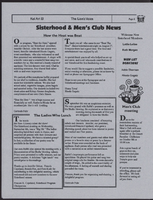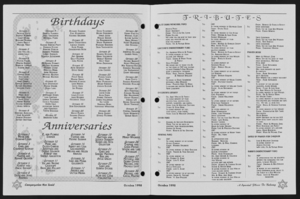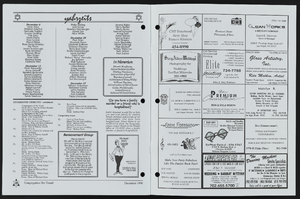Search the Special Collections and Archives Portal
Search Results
Doug Unger oral history interview
Identifier
Abstract
Oral history interview with Doug Unger conducted by Barbara Tabach on August 26, 2014 for the Southern Nevada Jewish Heritage Project. In this interview, Unger discusses his upbringing in Cleveland, Ohio, working at a family-owned mattress factory, and attending boarding school in Philadelphia, Pennsylvania. He recalls joining Jewish youth groups in Cleveland, his employment with Sealy Corporation, and buying his own mattress factory in Las Vegas, Nevada. Unger then talks about being invited to a Jewish Federation meeting, attending Temple Beth Sholom and Congregation Ner Tamid, and becoming more involved with the Jewish Federation (currently known as Jewish Nevada). Lastly, Unger discusses being co-chair of the Holocaust Library committee, fundraising for the Jewish Federation, and obtaining funding from Governor Brian Sandoval for the Jewish Federation.
Archival Collection


Newsletters from Adat Ari El (Las Vegas, Nev.), 2000
Date
Archival Collection
Description
Kol Ari El, The Lion's Voice newsletters from Adat Ari El Synagogue, 2000. The monthly newsletters include columns from the Rabbi, general interest information, announcements and birthday listings and yahrzeits.
Text

Transcript from interview with Mike Unger by Barbara Tabach, January 21, 2016
Date
Archival Collection
Description
In this interview, Unger reflects upon his long and successful career in hotel management in Las Vegas and also in Arizona and Pennsylvania. He shares stories as a local celebrity, particularly in the 1970s and 1980s when he worked at Caesars Palace, as well as the big projects he oversaw, including organizing the first big fight nights, World Series of Tavern Poker and Grand Prix race. He talks about working with Morris Shenker, Moe Dalitz, Cliff Perlman and Billy Weinberger, and the role of the Jewish community in the city, and specifically in the gaming industry. Unger also discusses his non-gaming industry ventures which have included a satellite communications business and a bagel business.
Mike Unger was born in Queens, New York in 1947, and spent most of his childhood in Long Island, growing up in a predominantly Jewish and Italian community. As a young adult, Unger was already working hard, running one of his family?s restaurant after school. When he was in high school, his family moved to Los Angeles to accommodate his father?s health needs, and eventually end up in Las Vegas by 1967. Over the next two decades, Unger would work at nine properties in the city. Unger is one of the University of Nevada, Las Vegas? first hotel management graduates, and started his career with Summa Corporation in its management training program at the Frontier Hotel and Casino. After a brief stint at the Airport Marina Hotel in Los Angeles in 1972, Unger returned to Las Vegas, serving in management capacities at the Aladdin Hotel and Casino, Summa Corporation headquarters and Landmark Hotel and Casino. In 1978, he joined Caesars Palace Hotel and Casino management team, and was integral in creating the city?s first large boxing events, the World Series of Tavern Pool, and the Grand Prix race. Unger also ran properties for the White Mountain Apache and Colorado River Indian Tribes in Arizona, as well as the Showboat Hotel and Casino. In this interview, Unger reflects upon his long and successful career in hotel management in Las Vegas and also in Arizona and Pennsylvania. He shares stories as a local celebrity, particularly in the 1970s and 1980s when he worked at Caesars Palace, as well as the big projects he oversaw, including organizing the first big fight nights, World Series of Tavern Poker and Grand Prix race. He talks about working with Morris Shenker, Moe Dalitz, Cliff Perlman and Billy Weinberger, and the role of the Jewish community in the city, and specifically in the gaming industry. Unger also discusses his non-gaming industry ventures which have included a satellite communications business and a bagel business.
Text
Justice Michael Cherry oral history interview
Identifier
Abstract
Oral history interview with Nevada Supreme Court Justice Michael Cherry conducted by Michael Geeser on April 10, 2006 for the I Remember When: Recollections from Las Vegas Jewish Leaders Oral History Project. Cherry talks about his legal career, and about being Jewish in Las Vegas. He also discusses his board membership at Temple Beth Sholom and serving as president of Temple Ner Tamid, as well as his activities in B'nai B'rith District 4. The interview concludes with questions from the audience.
Archival Collection
Arne Rosencrantz oral history interview
Identifier
Abstract
Oral history interview with Arne Rosencrantz conducted by Barbara Tabach on February 18, 2015 for the Southern Nevada Jewish Heritage Project. Rosencrantz discusses his family’s immigration story, him moving to Las Vegas, Nevada, and growing up within the Jewish community. Rosencrantz also discusses his involvement in the Las Vegas Jewish community over the decades.
Archival Collection

Transcript of interview with Michael Tell by Barbara Tabach, January 6, 2018
Date
Archival Collection
Description
Michael Tell, the youngest son of Jack and Beatrice Tell, is the publisher of the Las Vegas Israelite newspaper and the second generation of ownership. He briefly traces his Jewish ancestral roots back to Eastern European grandparents who settled in New Jersey and New York. He became a bar mitzvah in a conservative Jewish synagogue in New York City. At age sixteen, he accompanied his father, Jack Tell, westward to Nevada. The elder Tell was in pursuit of owning a newspaper and Mike was a perfect companion as Jack took over ownership of the Territorial Enterprise. Mike recalls it was a short lived venture and the family settled in Las Vegas, where his father went to work for Hank Greenspun at the Las Vegas Sun and then for Henderson Home News, owned by Morry Zenoff. In 1965, Jack Tell opened the Las Vegas Israelite. Meanwhile, Mike explored the lucrative business of concert promotions and opened a teen nightclub 1961 called the Twin Lakes Twist. He hired such talents of the era as Bobby Darin and Wayne Newton. Soon his business acumen grew and he moved Mike Tell Productions to Los Angeles. He tells the story of his last concert, booking Al Green, and being held at gunpoint. Then in 1979, he returned to work at the Israelite, which had a circulation of about 2000. The Jewish community was beginning to show signs of growth. He recalls running an ad in 1992 for High Holy Days services to be held at the Aladdin hotel. He used the word “Lubavitvh” in the ad and this sparked an interest in Las Vegas from the Chabad movement. He also recalls anti-Semitic episodes in Las Vegas, such as Ralph Englestad’s Hitler birthday parties and the presence of Skinheads. And he reflects on the changes in the community that he has observed over the decades.
Text



